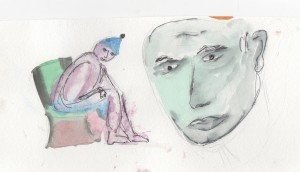The placebo effect is another opportunity to see how minds/brains work
The notion of mind over matter is absurd. Aren’t we talking about the interaction of matter and matter? When I am scared to death and my fear is irrational it doesn’t help for me to remind myself that it is all in my mind. Of course it is in my mind and it is as real as my startle to the sound of a slamming door.
We know relatively little about the brain mechanisms behind the placebo effect. We know that placebo effects can be demonstrated with some reliability. We know that the effect can be demonstrated in all kinds of people, smart, dumb, well educated or not, folks from the foothills of the Ural Mountains, and farmers in Kansas. We do know that we can influence our response to a placebo by changing the color of a pill, how much it costs and characteristics of the person who hands us the pill. No surprise, there have been many hundreds of studies of the placebo effect just in the last couple of decades. It seems we have been studying the placebo response forever.
Given the amount of placebo research already completed the scientific and practical yield has been disappointing. Perhaps the placebo effect is a bit like studying consciousness. Some issues are so seductive (like what is consciousness) that we have trouble letting go of the big question and tackling more digestible questions. In science asking the right question is the most important feature of productive research. Maybe we don’t know how best to ask questions about the placebo effect? Perhaps we have missed something obvious and so we keep doing the same types of studies and getting nowhere?
For example one of the favorite themes that has been studied via the placebo effect is pain. Based on this research arena it has been possible to demonstrate that the pain placebo effect activates the same brain regions as morphine, which makes sense and is also interesting.
Now you would think that if people were told that were receiving a placebo it would wipe out the placebo effect. Not so. In a study published Jan 8, 2013 in Science Translational Medicine researchers (Ted Kaptchuk and Rami Burstein) demonstrated that even when migraine sufferers knew they were taking an inactive treatment, according to their own notes the placebo still produced significant pain relief, compared to taking nothing at all.
In the study patients were treated for migraine headaches with an active painkiller as well as placebo with and without being told that it was placebo. While the drug was a superior pain reliever than the placebo, but the placebo effect accounted for at least 50 percent of the subjects’ overall pain relief. The surprising finding was that a truthfully labeled placebo pill still had pain-killing effects. Kaptchuk noted, “This tells us that the effectiveness of a good pharmaceutical may be doubled by enhancing the placebo effect.”
That is very interesting isn’t it?
In Latin placebo means “I shall please” and maybe the tools of neuroscience are beginning to be ripe enough to tackle the mechanism by which patients ‘pleasing’ their helpers makes the placebo response happen. Maybe pleasing anyone has nothing to do with the placebo response. Tune in or tune out.
